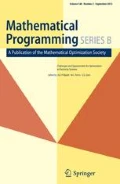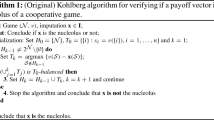Abstract
We provide an efficient algorithm for computing the nucleolus for an instance of a weighted cooperative matching game. This resolves a long-standing open question posed in Faigle (Math Programm, 83: 555–569, 1998).


Similar content being viewed by others
Notes
It is common within the literature, for instance in [30], to exclude the coalitions for \(S = \varnothing \) and \(S = V\) in the definition of the nucleolus. On the other hand, one could also consider the definition of the nucleolus with all possible coalitions, including \(S = \varnothing \) and \(S = V\). We note that the two definitions of the nucleolus are equivalent in all instances of matching games except for the trivial instance of a graph consisting of two nodes joined by a single edge.
References
Aumann, R.J., Maschler, M.: Game theoretic analysis of a bankruptcy problem from the talmud. J. Econ. Theory 36(2), 195–213 (1985)
Bateni, M., Hajiaghayi, M., Immorlica, N., Mahini, H.: The cooperative game theory foundations of network bargaining games. In: International Colloquium on Automata, Languages, and Programming, pp. 67–78. Springer (2010)
Biró, P., Kern, W., Paulusma, D.: Computing solutions for matching games. Int. J. Game Theory 41, 75–90 (2012)
Biró, P., Kern, W., Paulusma, D., Wojuteczky, P.: The stable fixtures problem with payments. Games Econ. Behav. 11(9), 24–241 (2017)
Brânzei, R., Solymosi, T., Tijs, S.: Strongly essential coalitions and the nucleolus of peer group games. Int. J. Game Theory 33(3), 447–460 (2005)
Chen, N., Lu, P., Zhang, H.: Computing the nucleolus of matching, cover and clique games. In: AAAI (2012)
Cook, K.S., Yamagishi, T.: Power in exchange networks: a power-dependence formulation. Soc. Netw. 14(3–4), 245–265 (1992)
Davis, M., Maschler, M.: The kernel of a cooperative game. Naval Res. Logist. Q. 12(3), 223–259 (1965)
Deng, X., Fang, Q.: Algorithmic cooperative game theory. In: Pareto Optimality, Game Theory And Equilibria, pp. 159–185. Springer (2008)
Deng, X., Fang, Q., Sun, X.: Finding nucleolus of flow game. J. Comb. Optim. 18(1), 64–86 (2009)
Deng, X., Ibaraki, T., Nagamochi, H.: Algorithmic aspects of the core of combinatorial optimization games. Math. Oper. Res. 24(3), 751–766 (1999)
Easley, D., Kleinberg, J.: Networks, Crowds, and Markets: Reasoning About a Highly Connected World. Cambridge University Press, Cambridge (2010)
Edmonds, J.: Maximum matching and a polyhedron with 0, 1-vertices. J. Res. Natl. Bureau Stand. B 69(125–130), 55–56 (1965)
Edmonds, J.: Paths, trees, and flowers. Can. J. Math. 17(3), 449–467 (1965)
Elkind, E., Goldberg, L.A., Goldberg, P., Wooldridge, M.: Computational complexity of weighted threshold games. In: Proceedings of the National Conference on Artificial Intelligence, p. 718 (2007)
Eriksson, K., Karlander, J.: Stable outcomes of the roommate game with transferable utility. Int. J. Game Theory 29(4), 555–569 (2001)
Faigle, U., Kern, W., Fekete, S.P., Hochstättler, W.: The nucleon of cooperative games and an algorithm for matching games. Math. Program. 83(1–3), 195–211 (1998)
Faigle, U., Kern, W., Kuipers, J.: Note computing the nucleolus of min-cost spanning tree games is np-hard. Int. J. Game Theory 27(3), 443–450 (1998)
Faigle, U., Kern, W., Kuipers, J.: On the computation of the nucleolus of a cooperative game. Int. J. Game Theory 30(1), 79–98 (2001)
Faigle, U., Kern, W., Kuipers, J.: Computing an element in the lexicographic kernel of a game. Math. Methods Oper. Res. 63(3), 427–433 (2006)
Faigle, U., Kern, W., Paulusma, D.: Note on the computational complexity of least core concepts for min-cost spanning tree games. Math. Methods Oper. Res. 52(1), 23–38 (2000)
Farczadi, L.: Matchings and Games on Networks. University of Waterloo, Waterloo (2015)
Farczadi, L., Georgiou, K., Könemann, J.: Network bargaining with general capacities. In: European Symposium on Algorithms, pp. 433–444. Springer (2013)
Gale, D., Shapley, L.S.: College admissions and the stability of marriage. Am. Math. Monthly 69(1), 9–15 (1962)
Gillies, D.B.: Solutions to general non-zero-sum games. Contrib. Theory Games 4(40), 47–85 (1959)
Granot, D., Granot, F., Zhu, W.R.: Characterization sets for the nucleolus. Int. J. Game Theory 27(3), 359–374 (1998)
Granot, D., Maschler, M., Owen, G., Zhu, W.R.: The kernel/nucleolus of a standard tree game. Int. J. Game Theory 25(2), 219–244 (1996)
Grötschel, M., Lovász, L., Schrijver, A.: Geometric Algorithms and Combinatorial Optimization, Algorithms and Combinatorics: Study and Research Texts, vol. 2. Springer, Berlin (1988)
Grötschel, M., Lovász, L., Schrijver, A.: Geometric Algorithms and Combinatorial Optimization, vol. 2. Springer, Berlin (2012)
Kern, W., Paulusma, D.: Matching games: the least core and the nucleolus. Math. Oper. Res. 28(2), 294–308 (2003)
Kleinberg, J., Tardos, E.: Balanced outcomes in social exchange networks. In: Proceedings of the fourtieth annual ACM symposium on Theory of computing-STOC 08, p. 295. New York, New York, USA (2008)
Koopmans, T.C., Beckmann, M.: Assignment problems and the location of economic activities. In: Econometrica: journal of the Econometric Society, pp. 53–76 (1957)
Kopelowitz, A.: Computation of the kernels of simple games and the nucleolus of n-person games. Tech. rep., Hebrew University Jerusalem (Israel) Department of Mathematics (1967)
Kuhn, H.W.: The hungarian method for the assignment problem. Naval Res. Logist. Q. 2(1–2), 83–97 (1955)
Kuipers, J., Solymosi, T., Aarts, H.: Computing the nucleolus of some combinatorially-structured games. Math. Program. 88(3), 541–563 (2000)
Lau, L.C., Ravi, R., Singh, M.: Iterative Methods in Combinatorial Optimization, vol. 46. Cambridge University Press, Cambridge (2011)
Lemaire, J.: An application of game theory: cost allocation. ASTIN Bull. J. IAA 14(1), 61–81 (1984)
Maschler, M., Peleg, B., Shapley, L.S.: Geometric properties of the kernel, nucleolus, and related solution concepts. Math. Oper. Res. 4(4), 303–338 (1979)
Megiddo, N.: Computational complexity of the game theory approach to cost allocation for a tree. Math. Oper. Res. 3(3), 189–196 (1978)
Nash Jr., J.F.: The bargaining problem. Econ. J. Econ. Soc. 10, 155–162 (1950)
Paulusma, D.: Complexity Aspects of Cooperative Games. Twente University Press, New York (2001)
Potters, J., Reijnierse, H., Biswas, A.: The nucleolus of balanced simple flow networks. Games Econ. Behav. 54(1), 205–225 (2006)
Rothvoß, T.: The matching polytope has exponential extension complexity. J. ACM 64(6), 41 (2017)
Schmeidler, D.: The nucleolus of a characteristic function game. SIAM J. Appl. Math. 17(6), 1163–1170 (1969)
Schrijver, A.: Combinatorial Optimization: Polyhedra and Efficiency, vol. 24. Springer, Berlin (2002)
Shapley, L.S., Shubik, M.: The assignment game I: the core. Int. J. Game Theory 1(1), 111–130 (1971)
Solymosi, T., Raghavan, T.E.: An algorithm for finding the nucleolus of assignment games. Int. J. Game Theory 23(2), 119–143 (1994)
Stearns, R.E.: Convergent transfer schemes for n-person games. Trans. Am. Math. Soc. 134(3), 449–459 (1968)
Willer, D.: Network Exchange Theory. Greenwood Publishing Group, Greenwood (1999)
Ziegler, G.M.: Lectures on Polytopes, vol. 152. Springer, Berlin (2012)
Acknowledgements
The authors thank Umang Bhaskar, Daniel Dadush, and Linda Farczadi for stimulating and insightful discussions related to this paper.
Author information
Authors and Affiliations
Corresponding author
Additional information
Publisher's Note
Springer Nature remains neutral with regard to jurisdictional claims in published maps and institutional affiliations.
This work was done in part while the second author was visiting the Simons Institute for the Theory of Computing. Supported by DIMACS/Simons Collaboration on Bridging Continuous and Discrete Optimization through NSF grant #CCF-1740425.
We acknowledge the support of the Natural Sciences and Engineering Research Council of Canada (NSERC). Cette recherche a été financée par le Conseil de recherches en sciences naturelles et en génie du Canada (CRSNG).
Rights and permissions
About this article
Cite this article
Könemann, J., Pashkovich, K. & Toth, J. Computing the nucleolus of weighted cooperative matching games in polynomial time. Math. Program. 183, 555–581 (2020). https://doi.org/10.1007/s10107-020-01483-4
Received:
Accepted:
Published:
Issue Date:
DOI: https://doi.org/10.1007/s10107-020-01483-4




